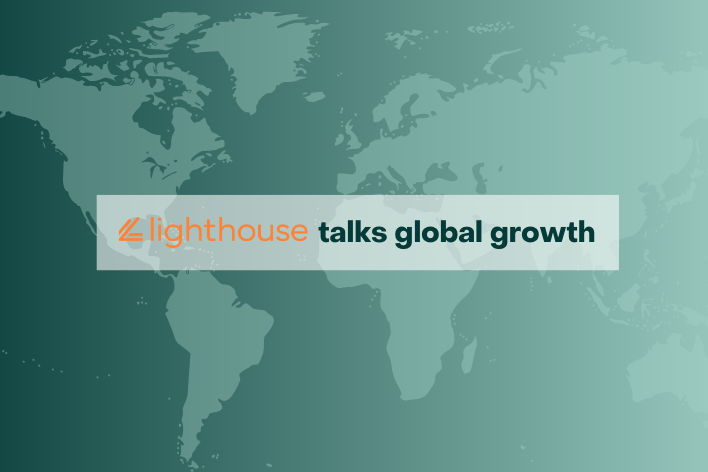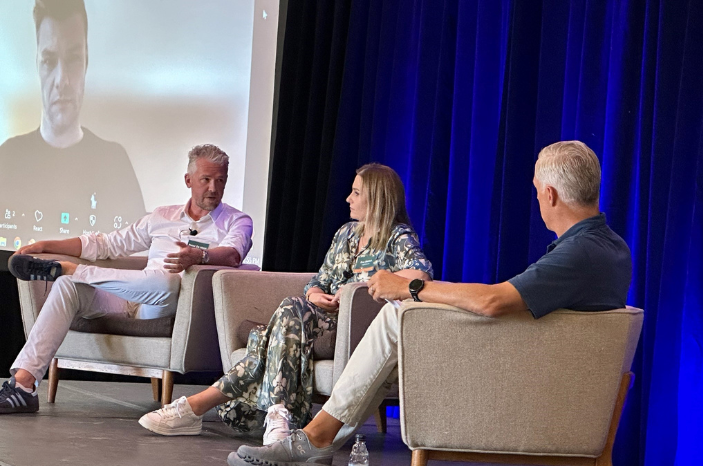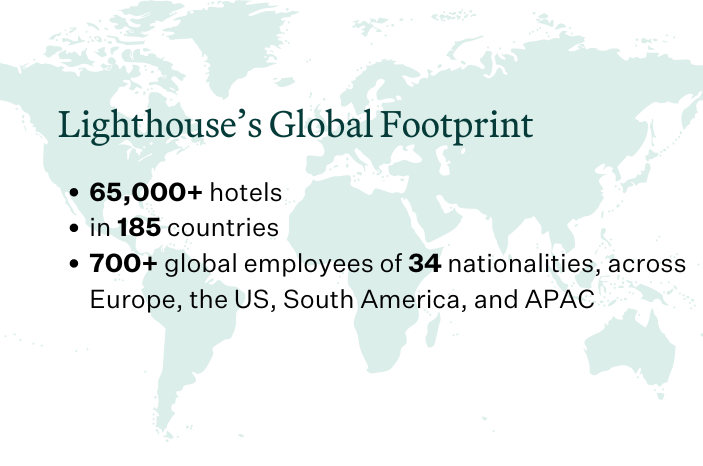
perspectives
Lighthouse Talks Global Growth: Scaling Finance, People, and Legal functions


Lighthouse is the definition of a “global business.” A commercial intelligence platform for the hospitality industry, the company serves customers in more than 185 countries, and has over 700 employees in eight offices across Europe, the US, South America, and APAC. Since its earliest days, Lighthouse has embraced the complexity of operating as a global business – whether conducting diligence on M&A opportunities in new markets or aligning internally across seven different time zones.
At a September summit for Spectrum portfolio leaders (including over 60 Finance, People, and Legal leaders from the Spectrum community), Managing Director Steve LeSieur sat down with the Lighthouse team to discuss international growth. Co-founder and CFO Matthias Geeroms, General Counsel Eva Metsu, and Chief People Officer Peter De Moor shared their insights on scaling a company with intention.

Lighthouse's Matthias Geeroms (on screen), Peter De Moor, and Eva Metsu on stage with Steve LeSieur at Spectrum's leadership summit.
A global vision from day one
Lighthouse was founded in 2012 with an ambitious, and prescient goal — to help hotels optimize their online pricing and revenue strategies.
Fittingly for an international business, the inspiration for Lighthouse came during the 2012 London Olympics. Co-founder and CFO Matthias Geeroms, along with his co-founders, found themselves searching online for hotel accommodations during the games. They noted that room prices were set prohibitively high, stifling demand. Potential customers gave up searching, shocked by the prices, leaving hoteliers scrambling to heavily discount the un-booked inventory.
The group thought there had to be a better, more intelligent way for hotels to understand market demand and set prices. And that better way became OTA Insight, which rebranded to Lighthouse in 2023.
Founded in London by three Belgians, “Lighthouse was focused on the international aspect from day one,” said Matthias. This global vision was more than just about seizing opportunities; it was necessary to the success of their deeply international customer base. “We realized that if you wanted to offer a solution to even a regional chain, you immediately have customers in multiple countries. We learned early on that we had to think and act like a truly international business.”
In the following years, the pressure to make faster, more dynamic decisions – and therefore the need for dynamic market intelligence – would only increase for their customers. And Lighthouse grew to meet that demand. After four years focused on Europe, the team began to replicate their success in the US and APAC – opening offices in Spain, Singapore, Denver, Dallas, and Brazil. As part of that process, Lighthouse also acquired four companies, increasing their access to priority data, complementing their product portfolio, and adding to their customer base.

Expanding their team without losing their core
As Lighthouse’s global footprint grew, their GTM function expanded into new markets – which meant hiring, onboarding, and training in new, international territories. Over time, the team developed a playbook to grow in new geographies without losing their focus.
“The business mantra is that you have to be where your customers are,” said Matthias, “But that also applies to employees – when we open a new office, we make sure to have existing ‘rock star’ employees on-hand to support hiring and training.”
“We set the bar high and are very clear with our expectations,” agreed Peter De Moor, Lighthouse’s Chief People Officer. “Leaders and managers are expected to recognize the cultural differences, but to focus on what remains consistent – our hiring criteria, our targets, and our goals.”
“They say that culture eats strategy for breakfast,” Peter continued. “But they actually need to be perfect counterweights. If one is out of alignment, they’ll eat each other.”
The Lighthouse approach to preserving culture:
Train on your values. All new Lighthouse hires, regardless of location, join an intensive two-week program either in Ghent or Denver, focused on understanding the company’s goals and values.
Strong employees iron out cultural differences. “As a company we keep customization to the minimum – both in terms of product and processes,” said Mattias. “But that’s only possible if you have strong culture carriers who can bring the global brand to local customers.”
Handling complexity without over-hiring
Eva Metsu, Lighthouse’s General Counsel, has had a front-row seat to the company’s international expansion, dealing with complex legal landscapes across different jurisdictions.
When Eva joined the company in 2018, they were starting their legal team from scratch – and it was also her first time as a solo legal counsel. “In the first year, I was definitely in more of an observational role – when I wasn’t putting out fires,” she said.
As the business quickly scaled, her priorities came into focus. “I started looking for ways to be efficient, and to use more automation,” said Eva. “My goal was to avoid adding headcount, while making my colleague’s lives easier.” In quick succession, she implemented a contract automation tool, making sure the business could self-serve on low value tasks like NDAs, and (more recently) the introduction of a ticketing system.
Eva’s team also brings on third-party advisors when necessary, especially when navigating new geographies with complex local laws. “For corporate law and employment matters, we engage outside counsel, but we handle business agreements ourselves.”
The Lighthouse approach to scaling Legal teams:
Remove friction before adding headcount. It’s tempting to over-hire in a growing business, but a bigger team isn’t always the solution. If there are processes that can be automated or simplified, start there.
You can’t be an expert in everything. As Eva’s team has found, it’s often more effective (and cost-efficient) to bring in outside support as they expand into new geos. Especially when it comes to complex, localized regulations, “It might make the most sense to work with a global firm with existing teams in the new jurisdictions,” said Eva.
Strategic growth through M&A
After a decade focused on organic growth, the Lighthouse team began looking for strategic M&A opportunities – a particularly important lever in the travel and hospitality space. All three functions – Legal, People, and Finance – were key elements to the Lighthouse’s diligence process.
During diligence, Eva’s focus depends on the target’s location and familiarity, but follows something of a pattern: corporate basics (incorporation, taxes, etc); existing business agreements and activities; and, of course, people. “During due diligence, you need to start thinking about what’s next for employees,” said Eva. “That might seem like a People and Talent problem, but Legal needs to stay on top of it too.”
For the People team, diligence often involves a less tangible factor: assessing the potential target’s culture. While Peter’s team has compiled a list of typical diligence requests – data around attrition, retention, the stability of the leadership team, eNPS, among other items – the real insights come from face-to-face conversations.
“Measuring culture is a tough one,” Peter admitted. “But once you have the data, you have something to talk about with the founders or CEO. You learn about the leadership’s vision, and you see how they approach their teams.”
After four M&A deals in less than three years, the leadership team has become more realistic about the work involved, along with the potential costs. “Acquiring companies is the ‘fun’ part,” said Matthias. “But once the honeymoon period is over, the real work starts.”
Lighthouse’s advice for leaders considering international M&A:
M&A is not a side project. M&A deals are hard to predict, which can often lead to under-resourcing. “Have a dedicated person, or people, with the skillset to support deals within each function,” said Peter. “As a CPO, I also need back-up on my team to take over day-to-day business when I’m pulled into M&A work.”
Create an M&A playbook for functional teams. “The learning curve is steep,” said Eva. “So if you want to ‘normalize’ M&A as part of your growth trajectory, you need to reduce the mental load.”
Start with a strong foundation. Acquisitions exacerbate misalignment; if there’s a lack of transparency at the leadership level, the complexity will make it worse. As Matthias put it: “In a high paced environment, it’s crucial to be surrounded by people you can trust.”
This article was based on transcripts from the 2024 Spectrum Equity Leadership Summit, a biennial event where Finance, People, and Legal leaders from the portfolio come together to share insights, collaborate, and enjoy each other’s company. Learn more about our portfolio companies and their leadership teams here.